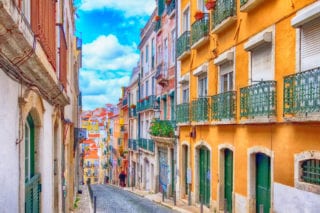What Expats Can Expect From the Cost of Living in Portugal
The cost of living in Portugal can be summed up in one word: Great! Expats love this country for good reason. Portugal has the lowest cost of living in Western Europe. Whether it’s groceries or housing, life in Portugal just costs less. In some cases, the difference is dramatic. For instance, Portuguese residents pay about 31% less for their lifestyle than their counterparts in the United Kingdom.
In fact, on housing costs alone, Portugal rings in at 40% less than the UK. Compared to the United States, the cost of living in Portugal is about 40% lower, and housing costs are about 33% lower. And as happy expats living in Portugal attest, low cost doesn’t mean low quality of life.
Portugal’s mild climate, superb wines, and beautiful beaches make for easy living. If you’re contemplating a move to Portugal, this article will help you prepare your budget and your expectations. Prices were sourced from Numbeo, Living Cost, and International Living. These prices were up to date as of August 2022.
How Much Does It Cost To Live in Portugal?
Compared to the rest of Europe, a modest income goes a long way in Portugal. The average monthly salary, after taxes, is about USD$881-1,077. If you’re committed to living frugally, you can live for less in Portugal. Many locals get by on less than USD$870-$1,060 a month. This adds to the enticement of living and retiring in Portugal.
A couple can live in one of Portugal’s smaller cities for about USD$990-$1,200 a month. While they’d have to eschew opulent luxuries, they’d enjoy a comfortable lifestyle with restaurant visits and weekend trips.
However, those based in Lisbon will find that just about everything is more expensive in Portugal’s capital. They should count on spending about USD$1,450-$1,770 a month to enjoy a similarly comfortable lifestyle.
Housing Costs in Portugal
Housing in Portugal is exceptionally affordable. Small apartments in the interior of the country sometimes rent for USD$315-$385 a month(though typical prices come closer to USD$500-$610.) However, a similar-sized home in a trendy Lisbon neighborhood could easily cost four times as much. But these prices still represent a bargain compared to the rest of Europe.
In general, expats should count on paying about USD$900-$1,100 for a small apartment in the heart of Lisbon. If you want more space, expect to pay about USD$1,800-USD$2,200 for a large three bedroom. If you don’t mind living outside the city center, you could save about USD$220 on a one-bedroom and maybe as much as USD$800 on something larger.
The cost of living in Porto, Portugal is a little more affordable when it comes to rental property. Porto is a popular city for those seeking a life in Portugal. Expats can expect to pay about USD$660-$810 for a small apartment in the city center. A three-bedroom property costs about USD$1,200-$1,460. If you don’t mind living in Porto’s suburbs, those prices drop to about USD$510-$620 and USD$850-$1,030 respectively.
Also Read: Best Places to Live in Portugal
Utility Costs in Portugal
As any expat knows, rent is just one component of your overall housing costs. Anyone moving to Portugal must budget for utilities and home services. Internet packages generally cost between USD$31 and USD$38. The combined cost of electricity, gas, water services, and garbage collection generally ranges from USD$98 to USD$120 a month. Note that bills are typically issued every two months.
If you’re carefully monitoring your budget, don’t forget the cost of running air conditioning, especially in the south of Portugal. The extra electricity makes summer survivable!
Understanding Healthcare Costs in Portugal
Portugal’s health care system delivers high quality at a reasonable cost. But while basic medical care is not expensive, if you encounter health challenges the costs for expats can skyrocket. That is one reason expats should consider international health insurance.
In order to get a residency visa or a work visa, would-be expats must demonstrate that they have their own healthcare policy. This is necessary so the Portuguese state knows that you’re not going to be a burden on their system.
Residents can sign up for the Serviço Nacional de Saúde or SNS, Portugal’s public healthcare program. While healthcare is universal, it is not free; there is a fee associated with various services. There are also many health issues such as vision and dental that are not covered by the SNS. This is why 20% of Portuguese citizens carry a private health insurance plan.
Expats who choose an international health insurance plan can be seen at private facilities in Portugal that have English-speaking doctors. If you are not fluent in Portuguese, this can give you great peace of mind. These plans will also cover you in other countries if you are exploring the Mediterranean and Europe from your home base in Portugal.
Budgeting for Food in Portugal
Apart from housing, food and entertainment costs usually make up the second-largest part of an expat’s budget. Predicting how much you’ll spend here is difficult. Much depends on where you’ll live and what kind of lifestyle you want.
In general, groceries for a month cost at least USD$275-$340. The cost of grocery staples, like rice, apples, oranges, bananas, onions, tomatoes, and potatoes all cost less than USD$2 a pound (and sometimes less than USD$1 a pound). A gallon of milk costs around $2.30-2.81, while a dozen eggs typically cost USD$1.72-$2.10. Chicken is fairly affordable at an average of USD$2.18-2.66, while beef costs nearly double that.
Things that are considered luxuries in many countries, like wine, olive oil, seafood, and shellfish are produced locally in Portugal and thus are very inexpensive. You can pick up a bottle of Portuguese wine for the equivalent of USD$3.68-$4.50. Domestic beer generally rings in at USD$0.98-1.20 a bottle.
On the other side of things, brand-name products from other countries, be it breakfast cereals or cleaning products, are disproportionately expensive.
Also Read: Safest Cities In Portugal
The Cost of Eating Out
Eating out is similarly affordable in Portugal. A cup of cappuccino at a cafe costs between USD$1.31-USD$1.61. Many cafes offer a prato do dia (lunch special or dish of the day) that costs anywhere from USD$7.37-$9.01. Simple fare, like a large sandwich from a bakery, is about 5 Euros and fast food combos cost a few dollars more. Meanwhile, a multicourse meal for two, including wine, will cost around USD$32-USD$39.
These are all averages. Depending on the city and the establishment, you could pay a bit less while anyone who loves trendy neighborhoods or who lives in Lisbon will pay a little bit more.
Portuguese Transportation Costs
One of the biggest perks of living in Portugal is the inexpensive transportation options. A single ticket on a city transportation network is less than USD$2 ($1.48-$1.80) and a monthly pass is about USD$36.85-$45.03. According to Portugal’s official rail site, a cross-country train ticket from Lisbon to Porto costs around USD$29.25-$35.75.
Related Articles:


